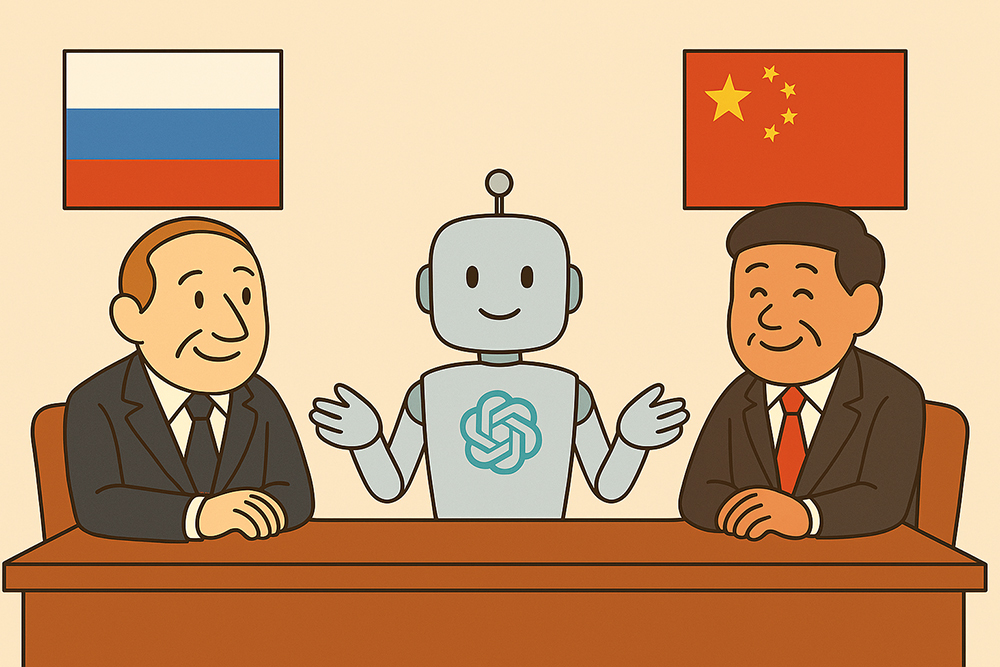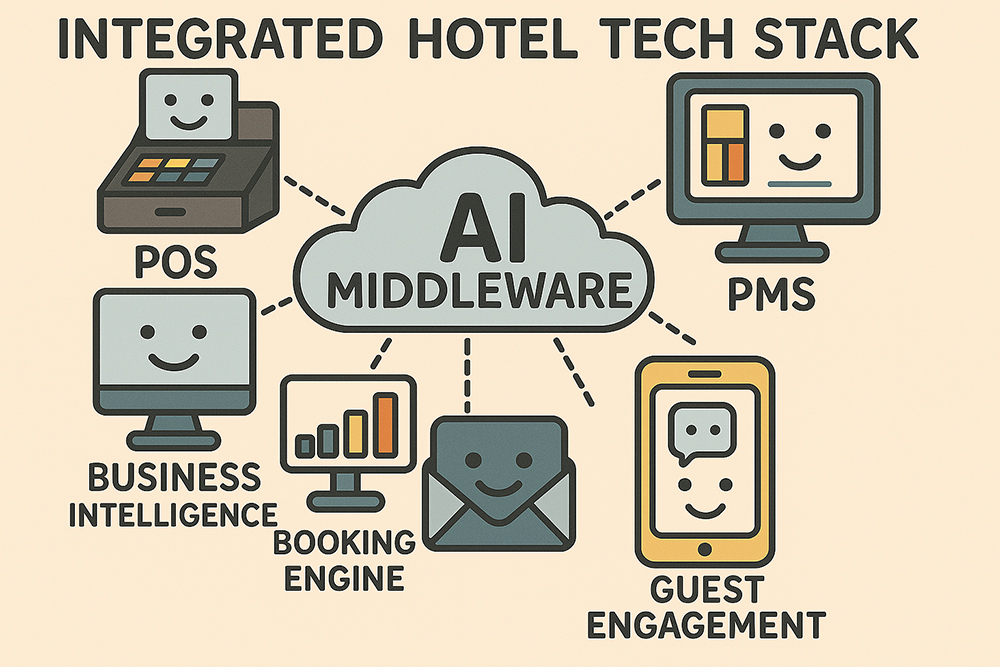The United Nations of Hotel Tech (A Cautionary Tale in Three Acts)


Synopsis
Let’s be honest. Hotel tech is a mess. Not a quirky, fix-it-with-duct-tape mess, but a full-on, integration-induced identity crisis. Every time a vendor tries to connect to a PMS, a developer cries. The industry has spent years chasing standards, frameworks, and white papers, only to end up with a Frankenstein stack of systems that barely speak to each other. And for what? So we can proudly say we built a digital house of cards that collapses the moment someone updates an API?
If you’ve ever tried to build or adopt a piece of hotel tech, you already know what a tangled mess we’ve gotten ourselves into. The hospitality industry doesn’t just have an interoperability issue — it has a full-blown, chronic, and crippling integration dependency disorder. It’s the main reason technology adoption remains sluggish, innovation stalls, and brilliant startups quietly die in dark basements of we couldn’t connect to all PMSs in the world.
But what if the answer isn’t more standards… but more intelligence?
Let me tell you a story…
Act One
Imagine this.
It’s a tense afternoon at the United Nations summit. Two world leaders sit across from one another: the Russian President on one side, the Chinese President on the other. They're both eager to collaborate on a joint economic initiative — maybe even something revolutionary.
There’s just one problem: they don’t speak the same language.

An American diplomat strolls over with smug confidence. He pulls up a chair between them and says, Alright, listen up. If you two want to work together, you’re both going to need to learn English.
The Russian raises an eyebrow. The Chinese President leans in, unimpressed. But we have words in Chinese that don’t even exist in English,
he says. How am I supposed to communicate something important — like ‘guanxi’ or ‘yuanfen’? These concepts just get lost in translation.
The American shrugs. Tough luck,
he says. That’s the only way. Learn the standard or go home.
The meeting ends with frustrated murmurs, vague diplomatic statements, and absolutely no progress. No deals, no collaboration, just an expensive waste of air conditioning.
That, dear reader, is how our industry has been treating integrations for the last two decades.
Act Two
Same summit, same table, same high stakes. Only this time, instead of the American standard-enforcer wedging himself between world powers, there’s something new: an AI-powered interpreter.
This bot doesn’t demand compliance. It doesn’t expect anyone to change their entire language system. It listens to the Russian President speak Russian. It listens to the Chinese President speak Chinese. And in real time, it interprets not just the words, but the intent, the context, the nuance. It even picks up on sarcasm and cultural idioms.

The presidents laugh. They collaborate. They start drafting plans. Deals get signed. Progress is made.
No one had to rewrite their constitution. No one had to “standardize” their culture. They were understood — as they are.
That’s what GenAI can bring to the hospitality industry.
Act Three
A follow-up scene where the AI interpreter gets promoted to Secretary General and rewrites the entire UN protocol handbook. And that’s basically what we need in our industry.
Standards Are Dead. GenAI Is the Future of Hotel Tech Integration.
Every piece of technology in hospitality — PMS, RMS, POS, CRS, CRM, IoT, you name it — really only does two things: it consumes data and it creates it. So, in a perfect world, they’d all be fluent in each other’s languages and trade data like old friends at a reunion.
But reality is more like a United Nations summit without translators. No one speaks the same dialect, half the participants don’t share their notes, and everyone’s afraid of touching anything new.
This results in fragmented, manual, error-prone workflows that require armies of humans to do what should be instant and automated. It’s inefficient, frustrating, and expensive — and it’s why many hoteliers just give up and stick to their legacy systems, even if they’re about as modern as a flip phone.
Why Standards Failed Us
You might be thinking, Wait, don’t we have standards? What about HTNG?
Yes, HTNG gave it a good try. And worked hard on it for 20+ years. But hospitality is a uniquely complex beast. It turns out you can’t fit a million different business models, tech stacks, and regional quirks into a one-size-fits-all white paper. The result? Vendors either ignore the standards, do their own thing, or use models that are about as helpful as a fax machine in 2025.
Trying to force vendors into compliance with rigid standards is like telling hotel guests to complete a tax return before they can unlock their room. Not gonna happen.
We’ve been living in the first Act of that story for way too long — forcing systems to conform to “standards” that only make sense to the people who wrote them, often disconnected from the messy reality of thousands of tech stacks, data models, and local business rules. And when those systems push back, we call them “noncompliant,” as if it’s their fault for not fitting into our square little boxes.
Enter GenAI: The Intelligent Middle Layer
So… what if we stopped trying to enforce uniformity — and instead used AI to translate chaos into clarity?
Let’s talk GenAI. Generative AI isn’t just about writing emails or creating creepy deepfakes. It can truly change the game. It’s the smart, multilingual, always-awake translator sitting in the middle. It just listens, interprets, adapts — and connects.
Imagine an AI-powered middleware layer that:
- Ingests unstructured, messy, non-standardized data
- Automatically understands each system’s “language”
- Translates inputs and outputs between platforms in real-time
- Reshapes data into a structured, usable format without manual mapping
Boom. No more one-off custom integrations. No more brittle APIs that break every time someone sneezes on the code. No more waiting six months for an interface that sort of works… if the moon is in Scorpio.
Think of it like Google Translate — but for software protocols. And smarter.
If hospitality tech has any hope of functioning like a true ecosystem rather than a siloed mess of incompatible languages and stubborn legacy protocols, we need to stop playing the role of the American diplomat.
Instead, we need to build — and trust — the intelligent interpreter.
The Technology Already Exists. So Why Aren’t We Using It?
Let’s be clear: this isn’t sci-fi. The foundational tech is already here. Large Language Models (LLMs) can now understand and manipulate complex code structures, and tools like vector databases and real-time inference engines can process dynamic, changing data on the fly.
So what’s stopping us?
Fear. Legacy inertia. Political turf wars. You name it.
In other words: it’s not the lack of tech that’s holding us back — it’s the lack of balls.
The Middleware of the Future: Not Just Pipes, but Brains
Here’s a bold idea: HTNG as an organization that has worked so hard on establishing standards for our industry doesn’t need to die — but it does need to evolve.
HTNG 2.0 shouldn’t be about setting more rigid rules. It should be the facilitator of an intelligent, GenAI-driven integration layer. Rather than publishing more “standards,” HTNG could champion a universal AI-based translation engine that understands legacy APIs, modern APIs, SOAP, REST, GraphQL, YAML, or some poor developer’s drunken attempt at JSON.
Imagine open-source GenAI models trained specifically on hospitality protocols. Imagine standard outcomes, not formats. That’s a future everyone could rally around.
Today’s middleware acts like plumbing. Tomorrow’s middleware needs to think.
With GenAI, middleware can become an intelligent router — figuring out, on the fly, how to get the right data from the RMS to the PMS, or from the CRM to the mobile check-in app.
Instead of building 1,000 custom PMS integrations, a vendor could build one connection to the AI middleware, which then handles the rest.
This is the future. And it’s already being prototyped in other industries.
A Call to Action: Let’s Make This Happen
The industry doesn’t need another white paper. It needs bold experimentation. Here’s what we need:
- Pilot Programs – Let’s get HFTP, AHLA/HTNG or another large organization to fund a GenAI middleware MVP. Show the world it works.
- Open-Source Collaboration – Pool training data, build shared models, and make the middleware smart enough to handle any vendor’s quirks.
- Focus on Results, Not Rules – Measure integration success not by compliance with old standards, but by speed, stability, and interoperability.
- Kill the Gatekeepers – Stop charging developers for API access or making them jump through arbitrary hoops. If you want innovation, open the gates.

Conclusion: We’re Closer Than You Think
Hospitality tech has long suffered under the weight of its own complexity. But with GenAI, we finally have the tool to end the nightmare. We can stop trying to make everyone conform to rigid standards and instead build a system that adapts intelligently to whatever it touches.
HTNG 2.0 could lead this revolution — if it has the courage to embrace intelligence over enforcement. And vendors, operators, and innovators alike could benefit from a world where technology just works together.
It’s not magic. It’s machine learning.
And it’s time we used it.